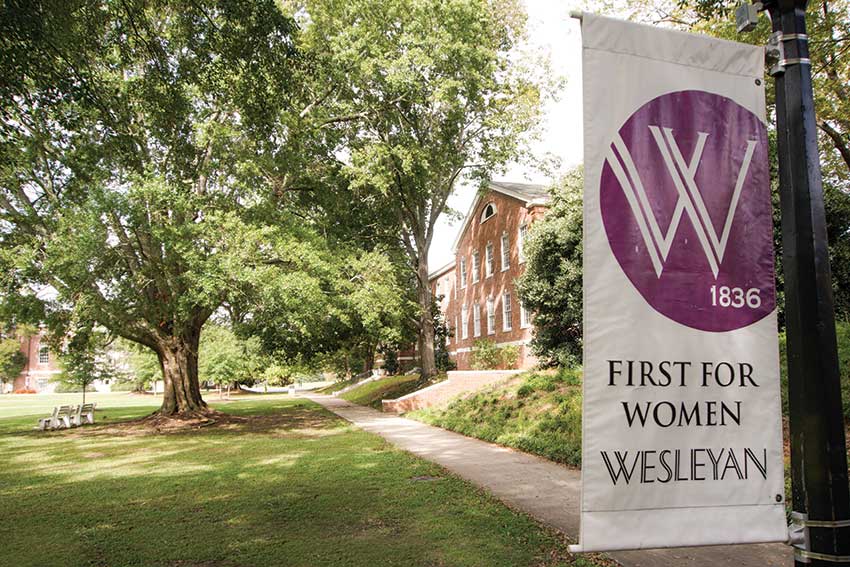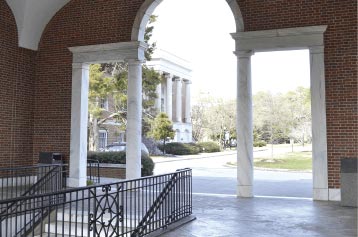CHM 100: Introduction to Chemistry: Chemistry of Life.
Goal: To use the chemistry of life to introduce, explain, and apply foundational chemical principles.
Content: This course will introduce students to important traditional concepts of chemistry through topics related to human health including, but not limited to, the following: acids and bases (acid-reflux disease), water (essential for life), aqueous solutions (electrolytes), vitamins (water- versus fat-soluble), energy changes in chemical reactions (burning of carbohydrates), organic structures (saturated, unsaturated, and trans fats). This four-hour course will include a weekly lab during which students will acquire and analyze data.
Prerequisites: MAT 130 or placement into MAT 140 or higher, or concurrent enrollment in MAT 130.
Gen. Ed. Category: Exploring; Natural World; (SM).
Credit: 4 hours (3 hours lecture and 3 hours lab per week).
CHM 101-101L: General Chemistry I.
Goal: To explore the nature of matter. To examine qualitatively and quantitatively the principles which govern the physical and chemical changes of matter. To encourage critical thinking, logical derivation, and creativity through solving problems. To develop an understanding of the composition and operation of the material universe and an appreciation of the greater environment. To prepare students for further studies in science.
Content: A comprehensive introduction to chemistry including stoichiometry, chemical reactions, properties of solutions, properties of gases, atomic structure, chemical bonding and molecular structure.
Prerequisites: MAT 130 or placement into MAT 140 or higher.
Gen. Ed. Category: Exploring how the natural world functions; (SM).
Credit: 4 hours (3 hours lecture and 3 hours lab per week).
CHM 102-102L: General Chemistry II.
Goal: To explore the nature of matter. To examine qualitatively and quantitatively the principles which govern the physical and chemical changes of matter. To encourage critical thinking, logical derivation, and creativity, through solving problems. To develop an understanding of the composition and operation of the material universe and an appreciation of the greater environment. To prepare students for further studies in science.
Content: A comprehensive introduction to properties of solids, liquids, and gases, properties of solutions, thermochemistry, reaction kinetics, chemical equilibria, metal complexes.
Prerequisites: Completion of CHM 101 with a grade of C or better.
Credit: 4 hours (3 hours lecture and 3 hours lab per week).
CHM 221, 222: Organic Chemistry I and II.
Goal: To examine the structure and the physical and chemical properties of carbon-based compounds and their derivatives. To understand mechanisms of organic reactions. To encourage critical thinking, logical derivation, and creativity, using organic synthesis as a vehicle. To apply laboratory techniques used in determining structures of organic molecules.
Content: An introduction to the chemistry of carbon compounds including their structures, physical and spectral properties, chemical reactivity, and synthesis. Laboratory work includes the isolation, purification, and identification used in determination of structures of organic molecules, as well as determination of physical and spectral properties.
Prerequisites: CHM 102; CHM 221 for CHM 222.
Credit: 4 hours.
CHM 225: Forensic Chemistry.
Goal: To build upon fundamental chemical principles by applying critical thinking skills to the area of forensic science. To understand the methods and challenges associated with forensic science from a chemical perspective.
Content: This course is designed to introduce students to the role modern chemistry plays in forensic applications as well as the scrutiny with which forensic data are usually subjected when they enter the legal system.
Prerequisite: CHM 100 or CHM 101.
Credit: 3 hours, cross-listed as FSC 225.
CHM 250: Principles of Environmental Chemistry.
Goal: To introduce content and methods in environmental chemistry. To analyze the environment in a chemical system.
Content: This course will explore the chemistry of the Earth through its bio-, litho-, and hydrosphere systems. Emphasis will be placed on the relationships between those systems and the methods used to study them. The effects of human activity on environmental systems will also be considered.
Prerequisite: CHM 102.
Credit: 3 hours.
CHM 318: Biochemistry.
Goal: To survey the structure, function, and metabolism of the basic classes of organic molecules. To interrelate the various metabolic pathways into a unified concept of metabolism at the organismal level.
Content: Protein, carbohydrate, lipid and nucleic acid structure and synthesis; the metabolic pathways in which these four classes of molecules participate.
Prerequisites: BIO 110, 112, CHM 101, 102, and 221 or permission of the instructor.
Credit: 3 hours; cross-listed as BIO 318.
CHM 320: Inorganic Chemistry.
Goal: To systematically examine the properties and reactions of inorganic compounds with an emphasis on structure and bonding and metal complexes. To read and understand current literature of inorganic chemistry.
Content: Structure, properties, and reactions of inorganic compounds with emphasis on main-group and transition elements are included.
Prerequisite: CHM 102
Credit: 3 hours.
CHM 342: Applied Chemical Analysis.
Goal: To provide students with valuable hands-on laboratory experience with modern chemical methods of analysis, including traditional volumetric methods as well as their instrumental counterparts, through a broad lens of applications of chemistry to the world around them.
Content: Students in this course will explore the various applications of chemical principles in the world around them as they analyze samples that have significance in a wide range of industrial settings.
Prerequisite: Completion of CHM 102 with a C or better.
Credit: 4 hours.
CHM 344: Analytical Methods for Problem Solving.
Goal: To provide students with an understanding of the methods used to detect and quantify environmental analytes, particularly of water and soil systems. To provide students with an understanding of methods used to analyze materials.
Content: Students in this course will learn to evaluate environmental systems for potential contaminants and learn methods to detect and quantify such contaminants. Students will explore the interconnectedness of different environmental systems (and human interaction with those systems) to understand how contaminants can enter the environment. Students will also use laboratory techniques to study properties and compositions of materials.
Prerequisite: Completion of CHM 102 with a C or better.
Credit: 4 hours.
CHM 361: Thermodynamics.
Goal: To examine the principles of chemical thermodynamics and their applications to phase and reaction equilibrium.
Content: An in-depth study of the first, second, and third laws of thermodynamics, and their application to physical systems at equilibrium.
Prerequisite: CHM 102, PHY 122 (or 116), and MAT 206.
Credit: 3 hours, cross-listed as PHY 361.
CHM 396: Special Topics in Chemistry.
Goal: To provide an opportunity to explore a topic not normally offered in the chemistry curriculum. To update students about new developments in chemistry.
Content: An in-depth examination of a special area of chemistry. Topics vary.
Prerequisite: CHM 102.
Credit: 3 or 4 hours. A student may take a maximum of six to eight semester hours (two courses) of special topics in any one field.
CHM 422: Research Experience in Chemistry.
Goal: To allow students to plan and execute a research project.
Content: Students will pursue research on a question of interest to them from the conception of the project to the presentation of results and their interpretation. Work will include researching and planning methods, implementing the laboratory research, keeping good records, interpreting results, and presenting the work.
Prerequisite: At least 16 hours in chemistry or permission of the instructor.
Credit: 3 hours.
CHM 424: Integrative Experience in Chemistry.
Goal: To allow students to integrate their knowledge and experiences in chemistry with other fields of study.
Content: Students will explore the connections between chemistry and other fields of study of particular interest to them. Their work will lead them to read and analyze primary literature, consider chemical problems from multiple sides, express their ideas orally and on paper, and reflect on their experiences as an applied chemistry major.
Prerequisite: At least 16 hours in chemistry or permission of the instructor.
Credit: 2 hours.
CHM 451: Directed Independent Study.
Goal: To enable an intensive exploration of a topic of special interest. To promote original, independent, creative, and critical thinking. To solve real problems in a scientific manner. To provide an opportunity to conduct independent laboratory work and to learn new techniques.
Content: Directed independent work of a critical or analytical nature. Under careful faculty supervision, qualified students are encouraged to develop originality of thought and thoroughness of method. Some emphasis on research methods.
Prerequisite: Permission of program director.
Credit: 1-6 hours.
CHM 452/199: Field Study.
Goal: To afford actual experience in a professional chemical laboratory or in industrial chemistry.
Content: Applied areas in chemistry or chemical employment. May be elected for internship credit. The student submits a brief plan including objectives, anticipated activities, a list of readings, and the nature of reports to be submitted to the sponsor.
Prerequisites: CHM 221; permission of advisor, program director, faculty sponsor, and the Director of Career Development.
Credit: 1-12 hours.
CHM 499: Honors Thesis. Fee Required.


Wesleyan College is privileged to steward many arts and cultural events and share them with the community. Most are free and open to the public. Wesleyan art galleries are open M-F 1-5PM and on Wesleyan Market Saturdays from 10AM-2PM.
Event listing
Tour our beautiful 200-acre campus featuring Georgian architecture, lush green spaces, recreational facilities, residence halls, and worship center.
Vist Wesleyan Virtually
Wesleyan College is home to five NCAA Division III sports: soccer, basketball, volleyball, tennis, and softball. In addition, we offer an award-winning Intercollegiate Horse Show Association (IHSA) Equestrian program.
View More